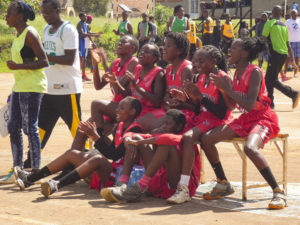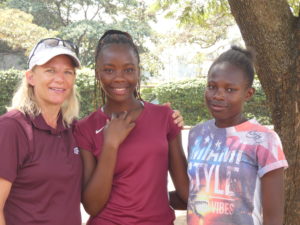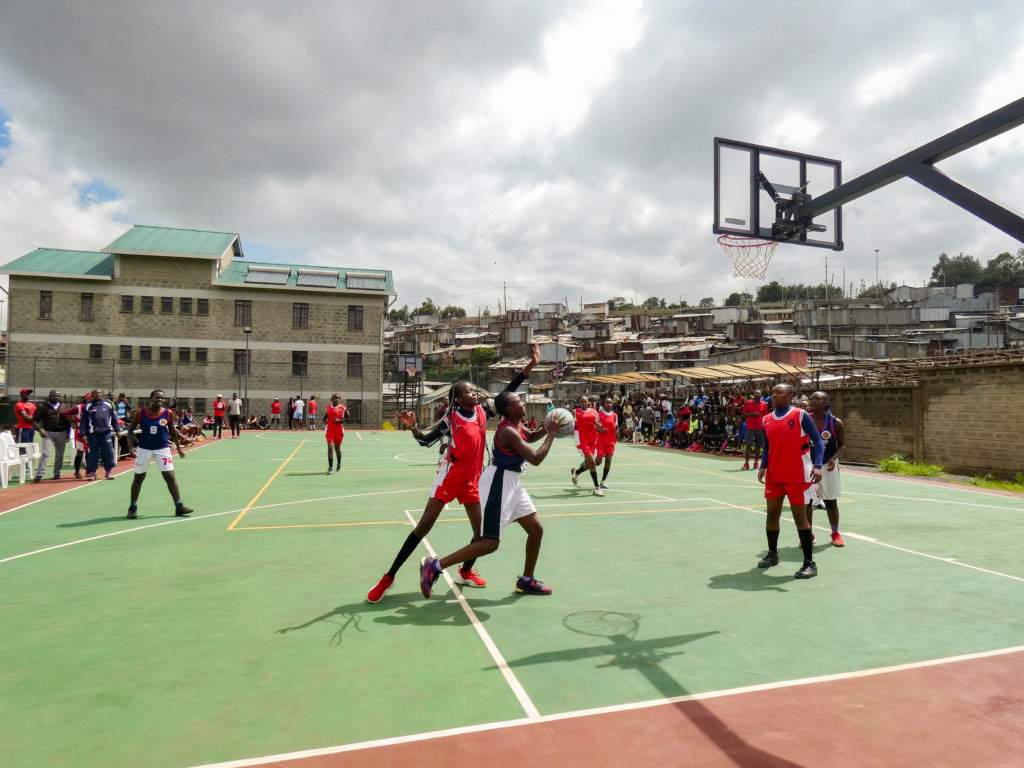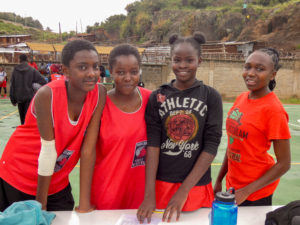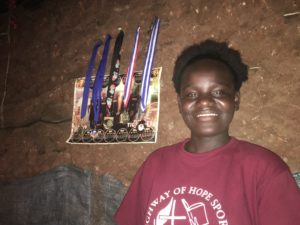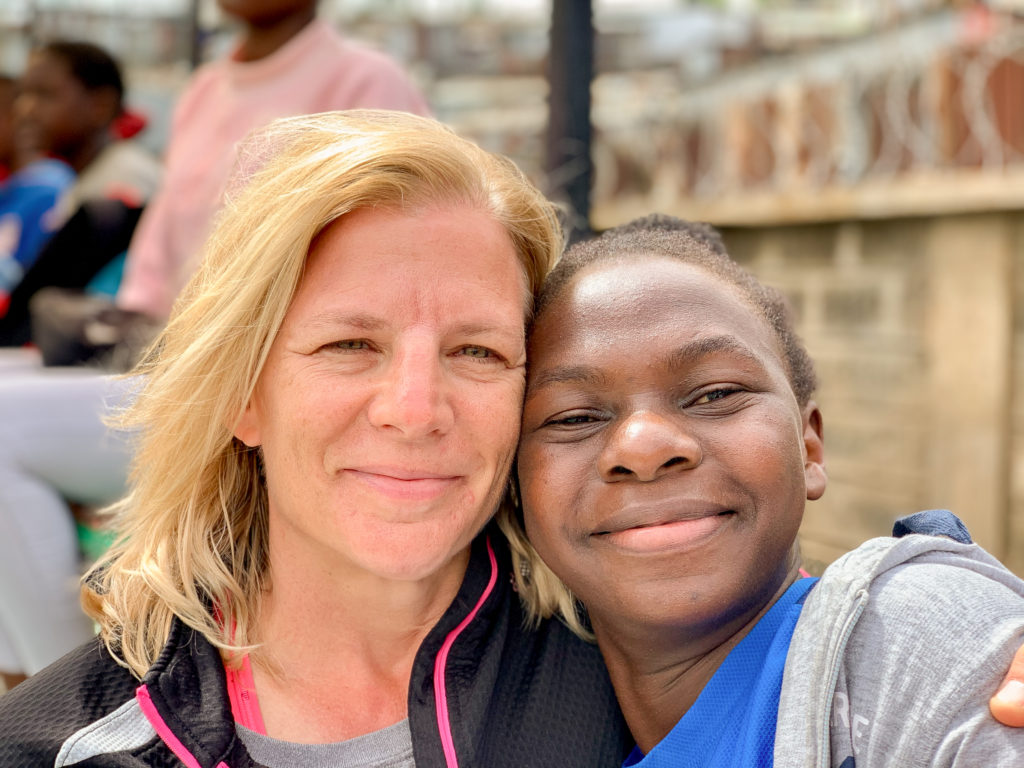Creating a highway of hope in Kenya
At just 12-years-old, Linda’s family faced the unthinkable. Linda’s family, in financial desperation, planned to sell her to a 40-year-old man. Her older sister helped her escape to live with her in the informal settlement of Kibera, often referred to as Africa’s largest slum, in Nairobi, Kenya.
There she could attend school, but life was far from easy. Subsistence income, demanding chores and persistent solicitation from local men created challenges for Linda in obtaining an education. Despite her struggles, she found a lifeline in a local basketball and mentoring program.
52 young women, like Linda, took this courageous opportunity through the Highway of Hope program. They showed changes in leadership, sport skills, educational adherence, spiritual growth and a sense of hope.
“This program and the people in it have saved my life,” Linda said. “I do not know what I would do without them.”
More than a sport
Highway of Hope is a sport for development program created through a partnership between Texas A&M University, Leadership Foundations and Athletes in Action. Dr. Marlene Dixon leads the effort for Texas A&M through the Center for Sport Management Research and Education.
“Sport for development is about using sport as leverage for outcomes like building courage, friendships and community,” said Dixon, professor of sport management in the Department of Health and Kinesiology.
From February to October, participants practice basketball two to three times weekly while receiving mentoring and life skills.
Named by a local pastor who wanted to improve the lives and bring hope to the children in Kibera, the project grew from being supported by local community members to include U.S.-based members, like Dixon, who have expertise in basketball, program design, program evaluation, facility design, mentoring and large project management.
Dixon delivered specific training for program leaders on trauma to show them how to help young women who have experienced traumatic situations through providing emotional and spiritual support.
“We want to create a safe environment among the young women who are going through the mentoring program together so they feel like they can share their hearts to move forward,” Dixon said.
Passion behind the project
Residents in Nairobi’s largest informal settlement face extreme poverty. Dixon first traveled there in 2012 with Athletes in Action. On this visit, Dixon recalled seeing a group of young women playing volleyball on a makeshift court out of a couple tires and poles.
“If the ball got away from them they had to hurry to get it because if it got down in the ditch, it is also the sewer,” Dixon said. “Yet, the young women were playing.”
Dixon’s passion for sport for development and young women came together as she joined Highway of Hope. She sees sport as a scaffolding place that builds on itself and in turn develops participants.
“People learn to test themselves through sport, and they learn that they can do more than they thought they could do,” Dixon said. “It has always been something I have known about sport and experienced for myself.”
Dixon quickly noticed that sport and schools were positive influences in the community. After visiting the schools, she said it became clear that they were seen as a place of safety and building capacity by the young women.
Challenging circumstances
Since Kibera lacks school districts like what is seen in the United States, the local program leaders along with Dixon had to build individual relationships with each school administration in the area. They co-created the program within each school, identifying supporters who would champion Highway of Hope not only within the school, but within the larger community.
Although soccer is the popular sport in Kenya, Kibera is too compact to support sprawling soccer fields. Highway of Hope built basketball courts at participating schools that had available space. However, these courts have logistical limitations. They are outdoor courts without covering, so if it rains that means no practice.
One school’s court is a one-mile walk away, which presents challenges in getting participants to practice. Some parents are reluctant for their daughters to participate in the first place, so the distance can become a convenient deterrent.
“A major obstacle we have had to overcome is trying to help families see the value of what we are doing,” Dixon said. “Because really their moms want them home taking care of their younger siblings, and cooking and cleaning.”
The family is the centerpiece of Kenyan culture, and the traditional role of women, especially young women, is to serve the family first. A typical day for a girl involves waking up before her family to prepare breakfast for her siblings before walking a mile or more to school. In the evening, she walks home and is expected to complete chores or generate dinner if there is none.
“It can be exhausting because these young women are really doing sport in their own time on top of all other responsibilities,” Dixon said.
Bringing out the best in them
At the start, the young women in the program lacked outward confidence. Dixon said upon meeting them they could not look her in the eyes and mumbled when they spoke.
“At first they would not even talk, and now we all laugh and speak freely as we ride the bus together,” Dixon said. “The change in these young women is palpable.”
As the young women learn about transformational leadership, Dixon hopes to show them how to develop leadership in their teammates.
“It has been really cool to watch them take responsibility and learn to love on their team,” Dixon said. “As team leader they could go first, but you watch them going last, giving what they have to the other young women.”
Team leader Johanna stood out to Dixon, and not just because of her skills on the court. Dixon traveled across Kibera to meet participants’ families in their homes, including Johanna’s.
Johanna lived in a 10-by-10 mud hut that lacked windows and running water. She shared the home with her mother, grandmother and seven sisters. The walls were bare, except for one spot.
“I looked up and the only thing on the wall were her basketball team poster and her medals,” Dixon said.
She asked Johanna if she could take a photo of her next to her medals. All she could think about was the amount of courage these young women had.
“Johanna is a smart, confident leader,” Dixon said. “I am not going to say that this program did that for her because she had that inside of her before, but I think it brings it out and it is a place to scaffold that.”
Then came COVID-19
The coronavirus made landfall in Africa on Feb. 14, 2020. It has ravaged underdeveloped areas like Kibera, where lack of running water make hand-washing difficult.
Since the pandemic hit, Highway of Hope has focused program efforts and funding on ensuring families have access to food. They gave 44 families two weeks’ worth of food for $360. The community has started to see that Highway of Hope is more than basketball.
“Families are seeing we actually love their kid, we love them, and we want to support this community no matter what,” Dixon said.
Linda received a scholarship to play basketball in Uganda. Since COVID-19, she has returned home to help her mom work the farms. She still makes time to complete her university coursework at a cyber café.
What’s next
Dixon’s goals for Highway of Hope are to expand practical skills offerings, modify the program for boys and eventually utilize the program in other countries.
“It is clear that the program impacts how the young women feel, act and think about the world, as well as their sense of hope and what they see for the future,” Dixon said. “But in terms of day to day practical skills and finding jobs, we still have a lot of work to do.”
The Highway of Hope program is an ongoing project. Linda and Johanna’s real names have been changed to protect their identities.
About the Writer
Heather is responsible for news coverage in the Department of Health and Kinesiology, as well as the Department of Educational Administration and Human Resource Development.
Articles by HeatherFor media inquiries, contact our Media Relations Coordinator, Ashley Green
Fundraising
To learn more about how you can assist in fundraising, contact Amy Hurley, Director of Development ahurley@txamfoundation.com or 979-847-9455


